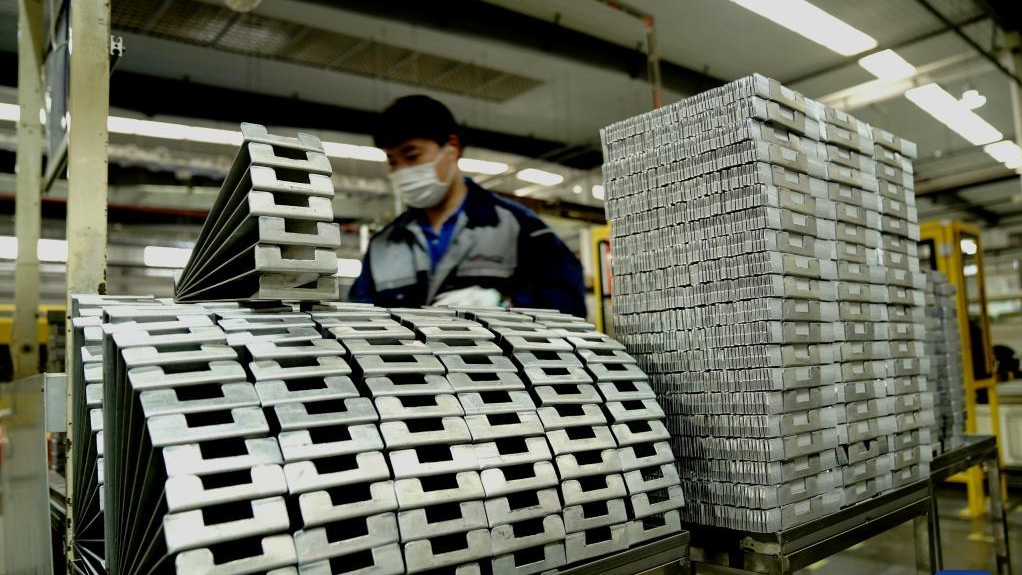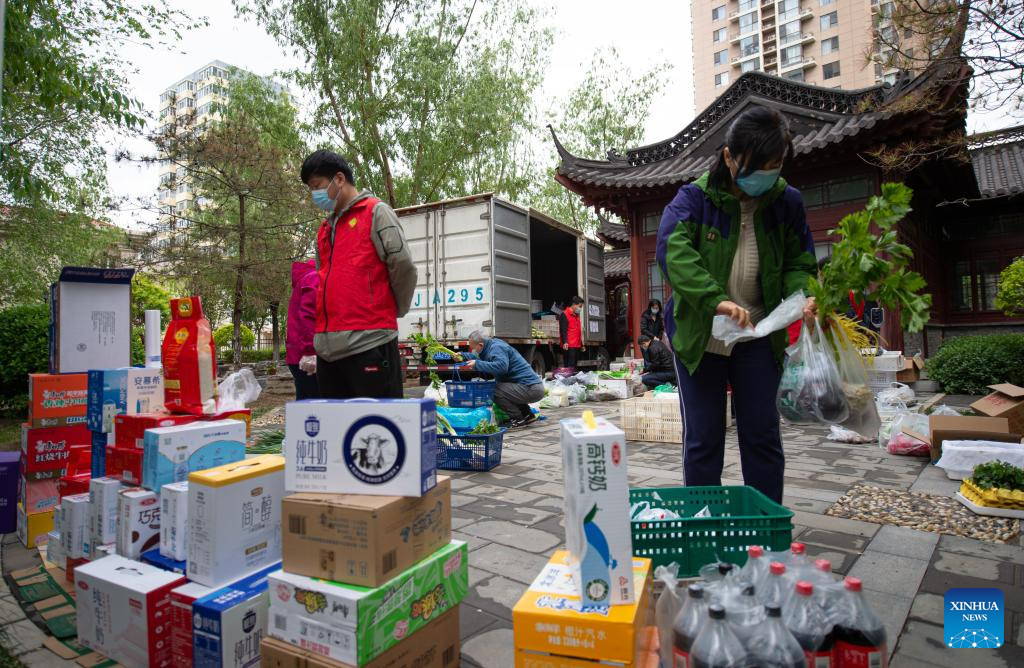
A workshop at Songz Automobile Air Conditioning Co. Ltd in Shanghai, east China, April 29, 2022. /Xinhua
A workshop at Songz Automobile Air Conditioning Co. Ltd in Shanghai, east China, April 29, 2022. /Xinhua
Editor's note: Xin Ge is an associate professor at the School of Public Economics and Administration, Shanghai University of Finance and Economics. The article reflects the author's opinions and not necessarily the views of CGTN.
President Xi Jinping, who is also general secretary of the Communist Party of China (CPC) Central Committee, presided over a meeting of the Political Bureau of the CPC Central Committee on April 29 to analyze and examine the current economic situation and economic work of China.
This meeting highlighted the hard-won achievements since the beginning of the year and stressed the importance of synergizing anti-pandemic efforts and economic and social development. The meeting urged officials at all levels to assume responsibility in preventing and guarding against "black swan" and "grey rhino" events amidst complexities, uncertainties and risks caused by the Omicron variant surge and the ongoing Ukraine crisis. Three key instructions on the meeting can be underlined: stabilizing economic growth, maintaining developmental security and upholding the dynamic zero-COVID approach.
Although China's GDP expanded by 4.8 percent year on year in Q1 of 2022, the whole external environment is becoming more volatile given the continuous impact of a ferocious Omicron flare-up and the evolving Ukraine crisis. In the United States, the economy contracted at an annual rate of 1.4 percent in Q1, while inflation remained elevated at levels not seen in four decades.
In light of the complication and uncertainties of the external environment, the meeting stressed multifaceted stability for economic development. First, it calls for stepping up macro policy adjustment to uphold economic growth within a reasonable range. The established policies will be swiftly implemented, including tax refunds and reductions, fee cuts and a range of monetary policy tools. Moreover, additional goal-oriented policies will be designed and carried out in a timely manner and given some leeway.
Second, domestic demand will be expanded. The government will continue to strengthen infrastructure construction, and give full play to the leading role of consumption in facilitating economic flow.
Third, the operations of the market players and entities need to be stabilized as well. It is essential to roll out a package of relief and assistance for industries, medium, small and micro enterprises, and self-employed individuals that have been severely hit by the pandemic.
Fourth, the supply of energy resources and price stability should be ensured, as well as stability of foreign trade and investment.

A temporary stand selling daily necessities in a community in Chaoyang District of Beijing, capital of China, April 28, 2022. /Xinhua
A temporary stand selling daily necessities in a community in Chaoyang District of Beijing, capital of China, April 28, 2022. /Xinhua
People's living standards should be improved with sufficient supply of essential goods. Meanwhile employment must be stabilized and expanded, workplace safety enhanced, and transportation and logistics ensured without impediments, to maintain overall social stability.
The second key instruction brought up by the Political Bureau is to give focused attention to major risks in economic and financial development. As has been said before, "housing is for living in, not for speculation." The local government will be given discrepancies to improve real estate policies according to specific requirements. Supervision on advance payment for commodity housing will be optimized so as to sustain steady and sound development of the real estate market.
It also seeks to respond to market concerns more quickly. While reform on a registration-based IPO system will be advanced, long-term investment should be guaranteed to warrant smooth operation of the capital market. The meeting also suggests proper measures to ensure a healthy development of the platform economy.
Restored confidence in the market was evident after the meeting. The benchmark Shanghai Composite Index was up 2.41 percent to above the critical level of 3,000 points on April 29 and the tech-heavy ChiNext board in Shenzhen also edged up by more than 4 percent to 2,319 points. The two markets saw a total of 4,400 stocks rallying and more than 300 stocks hitting the upper trading limit.
Last but not the least, the meeting stressed that the dynamic zero-COVID approach remains the best option for China, and the principle of "people first, lives first" should be firmed upheld. As a top Chinese epidemiologist, Liang Wannian, said at a press conference on April 29, a laissez-faire pandemic containment approach is not appropriate for China due to the lack of full vaccination for the elderly and underage populations, and the uneven medical resources across regions. Liang suggested that adopting the dynamic zero-COVID strategy could be regarded as "purchasing an insurance for 1.4 billion of Chinese people," noting that it has successfully protected people's lives and effectively abated the loss of life expectancy per capita.
Liang especially rebutted the claim that China's adherence to dynamic zero-COVID approach has "impinged economic growth," echoing a top National Health Commission official's note that since China has accumulated considerable anti-pandemic experience, the practical measures can be fine-tuned for the best interests of the people as the situation evolves.
It is apparent that China's achievements in virus-fighting policies and measures, and more importantly the adaptive people-centered economic policy adjustments, have made and will continue to make it the backbone of the post-COVID-19 global economic recovery and Asian economic integration.
(If you want to contribute and have specific expertise, please contact us at opinions@cgtn.com. Follow @thouse_opinions on Twitter to discover the latest commentaries on CGTN Opinion Section.)

